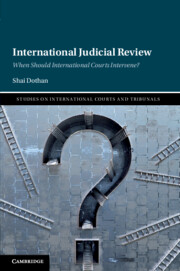Book contents
- International Judicial Review
- Studies on International Courts and Tribunals
- International Judicial Review
- Copyright page
- Dedication
- Contents
- Acknowledgments
- 1 Introduction
- 2 The Argument from Normative Legitimacy
- 3 The Argument from Systemic Epistemic Superiority
- 4 Why International Courts Improve Deliberation
- 5 Who Should Participate in the Courts’ Proceedings?
- 6 Creating the Right Incentives
- 7 Conclusions
- Bibliography
- Index
6 - Creating the Right Incentives
Published online by Cambridge University Press: 14 February 2020
- International Judicial Review
- Studies on International Courts and Tribunals
- International Judicial Review
- Copyright page
- Dedication
- Contents
- Acknowledgments
- 1 Introduction
- 2 The Argument from Normative Legitimacy
- 3 The Argument from Systemic Epistemic Superiority
- 4 Why International Courts Improve Deliberation
- 5 Who Should Participate in the Courts’ Proceedings?
- 6 Creating the Right Incentives
- 7 Conclusions
- Bibliography
- Index
Summary
Chapter 6 faces the final challenge to international courts' intervention, the fear that their intervention would lead to bad outcomes because it would change the incentives of relevant parties. It is true that domestic officials operate under the shadow of potential international intervention and this may give them bad incentives. The chapter demonstrates how the rules of admissibility used by international criminal tribunals can affect the incentive of national authorities on the one hand and individuals on the other hand. Understanding the interaction of officials on several levels helps to determine which rule of admissibility, complementarity or primacy, will lead to greater deterrence of international crimes. These admissibility rules can also determine the willingness of countries to submit to the jurisdiction of international courts, to begin with.
Keywords
- Type
- Chapter
- Information
- International Judicial ReviewWhen Should International Courts Intervene?, pp. 112 - 132Publisher: Cambridge University PressPrint publication year: 2020

